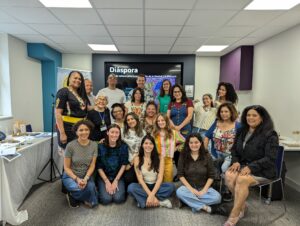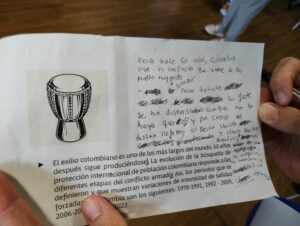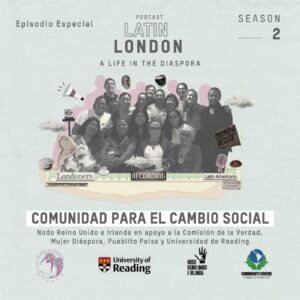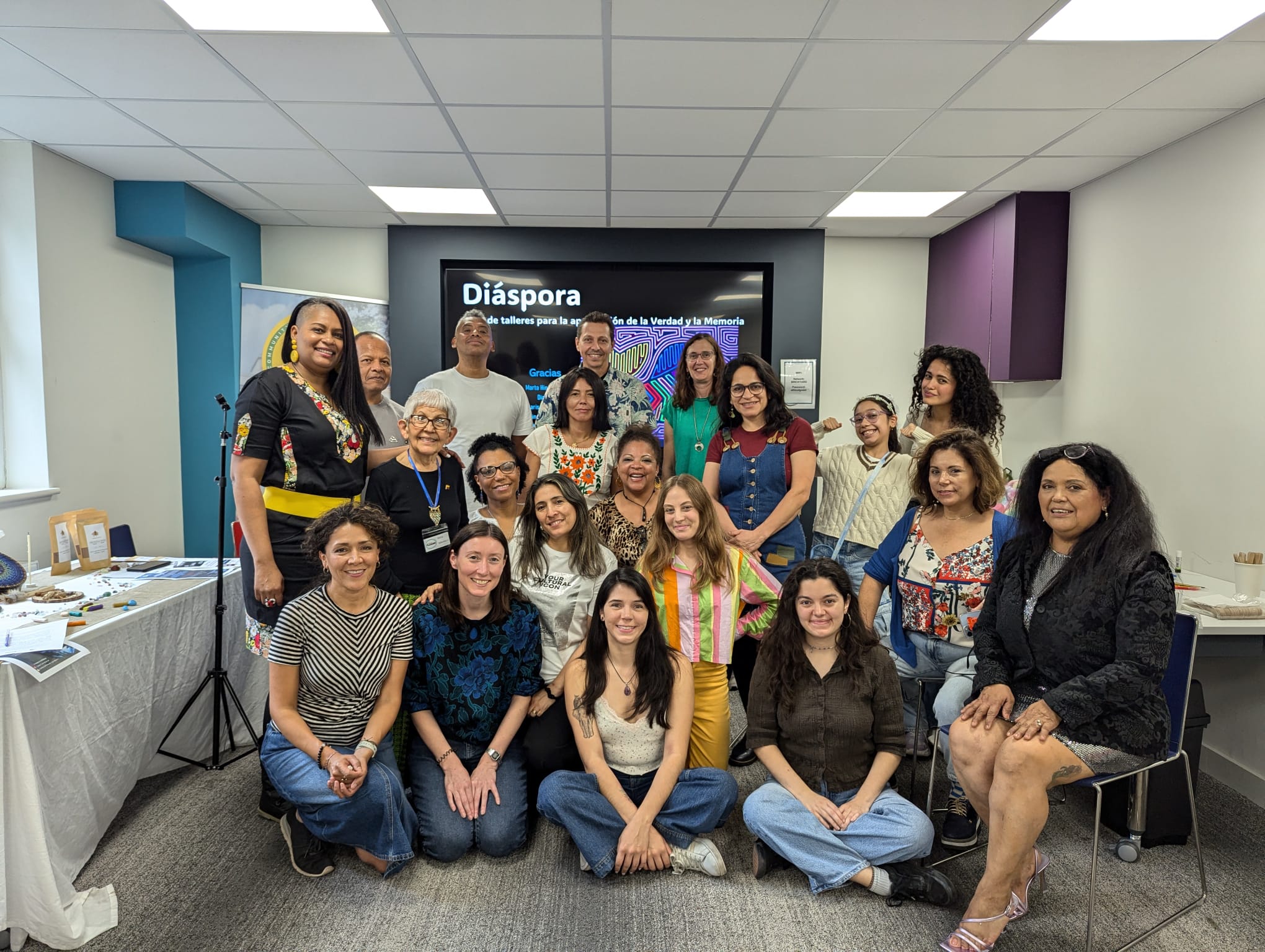Report by Cherilyn Elston

Introduction:
While there were an estimated 5 million Colombians living abroad at the end of the first decade of the twenty-first century, they have been a largely invisible population, ignored in the extensive literature on Latin American exile, as well as scholarship on global diasporas. Colombian international migration, consequently, has been interpreted as economic rather than as a result of the country’s more than half century armed conflict, and there has been a predominant perception that Colombians outside of Colombia “lack a sense of shared identity as a diaspora community” (Bouvier 2007: 137).
This invisibility, however, has been challenged over the last decade, particularly around the transitional justice mechanisms emerging from the country’s 2012-2016 peace process, where the Colombian diaspora not only sought unprecedented representation within the negotiations but also pushed for an official recognition of exile and forced displacement from Colombia as a consequence of political violence in the country. The recent Colombian Truth Commission has been celebrated as one of the first in the world to systematically include the diaspora and take testimony from victims abroad, including an entire volume dedicated to exile in its final report.
Colombian memory activists in the diaspora have been key to achieving this change; and since 2019 Dr Cherilyn Elston, from the Department of Languages and Cultures at the University of Reading, has been collaborating with Colombian exiles, migrants and refugees in London to explore how they have articulated new understandings of exile, migration and diaspora within narratives of the Colombian armed conflict, as well as constructed new forms of diasporic community and agency within migratory contexts, such as the UK, where they are doubly invisible.
Deploying participatory research methods, this collaboration has resulted so far in two cycles of workshops (in 2022 and 2024) co-designed with some of the key Colombian community organisations, such as Diaspora Woman and Community Centre Pueblito Paisa, who formed part of the UK and Ireland Hub, a grassroots network of volunteers set up in 2019 to support the work of the Colombian Truth Commission. Bringing together almost 100 members of the Colombian community in London across the different workshops, these had two complementary aims. In 2022, the objective was to create a space of psychosocial support for Colombian exiles who had given their testimony to the Truth Commission; in 2024, the objective was to explore the findings of the Truth Commission (published 2022) and inquire how they could be catalysed to positively impact the lives of Colombians in the UK.
The participatory co-design of the projects, and particularly the creative methodologies that the grassroots project partners have centred in our research design, have produced arguably its key finding. In both cycles of workshops the community researchers and participants made clear that their priority was less to focus on testimonies of violence – although both cycles did explore the new narratives of the conflict, including exile, emerging from the Truth Commission and participants’ experiences – to instead explore the creative resistance and resilience of Colombians in the diaspora, as well as bring the often fragmented Colombian community together and use cultural practices to reconnect with other members of the diaspora and their roots; relationships that have often been damaged by the painful processes of migration and exile.
Breakthrough Studies:
Over the last few decades, global approaches to peacebuilding have increasingly turned to transitional justice, which, as the UN defines it, refers to the “range of processes and mechanisms associated with a society’s attempts to come to terms with a legacy of large-scale abuses” (2004). Significantly then, transitional justice, which generally includes a mixture of judicial and non-judicial measures, such as trials, truth commissions, reparations and institutional reforms, amongst others, seeks to balance competing demands for punishment for perpetrators of violence with the need to ensure political stability, peace and reconciliation through alternatives to retribution and other initiatives that could benefit victims, such as providing the truth of past events.
While the language and tools of transitional justice have been applied in numerous societies emerging from authoritarian rule or armed conflict, including Colombia, there have also emerged growing critiques that have questioned transitional justice’s underlying assumptions and normative status in peacebuilding efforts. Nuancing transitional justice’s transcendent claims, critical scholars have challenged the field’s narrow focus on the state, its preference for legal-institutional reforms, and erasure of the socio-economic or structural causes of conflict (Zunino 2016), to advocate for a “thicker” understanding (McEvoy 2007) of how the concept works in “specific fields of political contestation” (Theidon 2009: 296). Significantly, this includes the role of diverse grassroots organisations in promoting alternative narratives of a contested past through pursuing their own justice and memory projects, as well as how they put pressure on the form transitional justice is taking. Indeed, since transitional justice was first implemented in Colombia in the mid 2000s, “community and civil society organisations have themselves increasingly deployed legal and ‘transitional’ terminology in pursuit of their objectives” (Díaz 2008: 199) and there have been a plethora of non-official memory initiatives (Reátegui 2009) led by victims, human rights groups, peace activists, relatives of the disappeared and those displaced by the conflict, including exiles, which could be defined as transitional justice from below.
In response to the activism of Colombian migrants, exiles and refugees around the 2012-2016 peace process, scholars have recently turned their attention to the engagement of the Colombian diaspora in the country’s recent transitional justice processes (Iranzo Dosdad and Edson Louidor 2018; Parmentier et al. 2022), as well as analysed the proliferation of numerous grassroots initiatives seeking to reconstruct the historical memory of Colombian exile and influence the peace negotiations (Martínez-Leguízamo 2022: 123). Yet, attention has yet to be paid to how, like many of the grassroots transitional justice initiatives within Colombia, these projects have been characterised by creative methodologies more closely associated with the field of arts and culture than law and social policy in their pursuit of truth and justice. Indeed, despite an institutional and judicial recognition of the importance of symbolic reparations in providing redress for victims, transitional justice literature has tended to ignore the role of the arts and cultural interventions in societies in transition (de Greiff 2014) and only recently have scholars begun to explore the reparative potential of creative practices, for example in creating space for public mourning and giving voice to previously silenced groups (Bahun 2015; Rush and Simić 2014).
Methodology:
The project developed from my long-term collaboration with collectives of Colombian migrants and refugees in London, in particular my participation in the UK and Ireland Hub. The Hub (“nodo” in Spanish) was one of 24 set up across the world to facilitate the participation of members of civil society in supporting the gathering of testimonies from Colombian exiles. This collaborative methodology importantly drew upon significant grassroots memory projects led by collectives of Colombian exiles, which have been influential antecedents to the work of the Truth Commission. One of these was the charity Diaspora Woman, a key organisation within the Hub, set up in London in 2014 to create a space for psycho-social healing, empowerment and recognition of Colombian women exiles, migrants and refugees as agents for peace and social transformation.
Diaspora Woman have pioneered a distinct methodology, which they term “active memory”. Therefore, while a central part of their activities has involved taking testimony from Colombian women exiles this has reconfigured what could be an extractive practice into a collective process that involves cooking, creative and ritual activities and an active reflection on the testimonies in which the women themselves collectively transform them into sources of knowledge. This methodology combines feminist insights about the situatedness of all knowledge with participatory action research, a method emerging from campesino organising in Colombia that challenges the traditional distinction between the subject and object of research and conceptualises research as a tool for political transformation.
Drawing together then a team of community researchers from Diaspora Woman, members of the Hub, as well as Community Centre Pueblito Paisa (a Colombian community organisation supporting local traders at Seven Sisters Indoor Market in North London), both cycles of workshops deployed participatory methods in which Colombian exiles and migrants co-designed and led the workshops, agreed the agenda and convened participants from the wider Colombian community. This collaborative co-design meant that rather than an external academic setting the research questions and imposing their interpretation on the findings, the community themselves were in control of the research, and moreover, could decide the form this knowledge creation would take.
Significantly this did not involve the production of traditional academic outputs but creative modes of knowledge production led by the community. Eschewing conventional social science research methods or extractive forms of testifying to violence, my Colombian collaborators have instead foregrounded arts-based and creative approaches in the workshops, drawing on distinct Colombian rituals or cultural practices, such as bullerengue, as well as broader visual, performative and embodied modes of research. This has importantly resulted in the collective creation of communicative outputs, such as a podcast, songs, performances and participatory videos emerging from the workshops.

The Impact of the Research on Policy and Practice:
Through facilitating spaces for community engagement with the findings of the Truth Commission, as well as supporting the grassroots memory activists who have led innovative memory projects that resulted in the inclusion of exiles in the Truth Commission in the first place, the research highlights the importance of a participatory approach to transitional justice and the need for creative and artistic methods that reflect the practices of the community itself.
Feedback from participants testified to the impact of the workshops on members of the Colombian community, emphasising how they had helped them build community, understand their agency as exiles and migrants, and the importance of transforming narratives of violence into artistic expressions:
- “[the workshops] developed our knowledge through different creative strategies. They also created networks of support”.
- “[The workshop] allowed us to understand how we can be active agents from here [exile in the UK]”.
- “We not only leave with information about the findings [of the Truth Commission] but with energy and confidence that we can turn the findings into artistic expressions”.
The workshops also provided a space for the community organisations not only to develop links within the community but also to influence Colombian policy makers in the UK, for example through inviting the Colombian Consul to attend one of the workshops in 2024.
Initial results have been shared through the podcast and project report. They have also been disseminated in the academic community. A one-day event at the University of Reading in 2022, ‘Creative Participatory Research with the Latin American Community in the UK’ allowed for experience sharing with other participatory projects working with the Latin American community in the UK.
Future Directions:
Echoing the recent “creative turn” in research on violence and migration, which has recognised how arts-based participatory methods can enable more ethical research practices with marginalised groups, allowing “them to re-signify their own narratives and to confront power asymmetries” (McIlwaine and Ryburn 2024: 3241), these pilot projects show not only the importance of moving beyond top-down visions of transitional justice or narratives of violence, but how participatory methods, which include creative, artistic and cultural modes, are essential for allowing communities to articulate their own narratives of memory, justice and social change.
These projects, however, explored creative participatory methods in the context of the construction of official transitional justice mechanisms in Colombia. Other recent scholarship has argued that faced with the failure of transitional justice to provide real transformative justice, an analysis of the everyday creative and artistic practices of grassroots collectives could provide better insight into how communities construct other forms of knowledge, justice, collective memory and social change that exceed the limits of official mechanisms (Anctil Avoine et al. 2024). Further research therefore is needed to explore the long-term creative practices of Colombian exile and migrant communities seeking to produce transformative change both within Colombia and the migratory contexts they reside in.
Key Publications:

Co-produced podcast episode ‘Comunidad para el Cambio Social/Community for Social Change’ on the Latin London podcast (2022).
Project report ‘Catalysing the Digital Archives of the Colombian Truth Commission for Peacebuilding in the UK’ (2024).
B33034 Impact Project Report – Colombian Diaspora
Research Awards and Recognitions:
Research England Participatory Research Fund
University of Reading AHRC Impact Accelerator Account (IAA)
About the author:
Dr Cherilyn Elston is Associate Professor in Latin American Cultural Studies at the University of Reading. She researches Colombian history, literature and culture, with a particular focus on women’s writing, gender and the armed conflict, and, more recently, exile and the Colombian diaspora. Her first monograph, Women’s Writing in Colombia – An Alternative History (Palgrave Macmillan 2016) was awarded the Montserrat Ordóñez prize by LASA in 2018.
https://research.reading.ac.uk/latin-america-caribbean-network/dr-cherilyn-elston/
Collaborators:
Agradecimientos to Marta Hinestroza, Marina Echeverría, Diana Perea, Damaris Hernández, Luis Fernando Sepúlveda from Diaspora Woman, Community Centre Pueblito Paisa and the Hub for co-designing and leading the workshops.
Many thanks to Veronica Posada Álvarez for leading the podcast workshop and hosting the special episode on Latin London; and to Rocío Méndez for leading the workshop on participatory video.
Contact information:
Cherilyn Elston (c.elston@reading.ac.uk)
Diaspora Woman: https://www.mujerdiaspora.com/home
Community Centre Pueblito Paisa: https://www.facebook.com/p/Community-Centre-Pueblito-Paisa-CIC-100081437171452/
UK and Ireland Hub: https://www.comisiondelaverdad.co/nodo-reino-unido-e-irlanda
References and Further Reading:
Anctil Avoine, Priscyll, María Martín de Almagro and Yira Miranda Montero. 2024. “Singing Truth to Power: Transformative (Gender) Justice, Musical Spatialities and Creative Performance in Periods of Transition from Violence.” Security Dialogue, 0 (0): 1-21. https://doi.org/10.1177/09670106241232265
Bahun, Sanja. 2015. “Transitional Justice and the Arts: Reflections on the Field.” In Theorizing Transitional Justice, edited by Claudio Corradetti, Nir Eisikovits and Jack Volpe Rotondi. Routledge.
Bouvier, Virginia. 2007. “A Reluctant Diaspora? The Case of Colombia.” In Diasporas in Conflict: Peacemakers or Peace wreckers?, edited by Hazel Smith and Paul Stares. United Nations University Press.
Díaz, Catalina. 2008. “Challenging Impunity from Below: The Contested Ownership of Transitional Justice in Colombia.” In Transitional Justice from Below, edited by Kieran McEvoy and Lorna McGregor. Hart Publishing.
de Greiff, Pablo. 2014. “On Making the Invisible Visible.” In Transitional Justice, Culture, and Society: Beyond Outreach, edited by Clara Ramírez-Barat. Social Science Research Council.
Iranzo Dosdad, Ángela and Wooldy Edson Louidor. eds. 2018. Entre la paz y la guerra: los lugares de la diáspora colombiana. Universidad de los Andes, Pontificia Universidad Javeriana.
Martínez-Leguízamo, Jeisson Oswaldo. 2022. “El informe del exilio colombiano para la Comisión de Esclarecimiento de la Verdad: innovadora experiencia transnacional de construcción de memoria y lucha por la verdad en contexto de pandemia.” Forum. Revista Departamento de Ciencia Política 22: 117-141. https://doi.org/10.15446/frdcp.n22.96175.
McEvoy, Kieran. 2007. “Beyond Legalism: Towards a Thicker Understanding of Transitional Justice.” Journal of Law and Society 34 (4): 411-440. https://doi.org/10.1111/j.1467-6478.2007.00399.x.
McIlwaine, Cathy and Megan Ryburn. 2024. “Introduction: Towards Migration-violence Creative Pathways.” Journal of Ethnic and Migration Studies, 50 (13): 3229–3251. https://doi.org/10.1080/1369183X.2024.2345988
Parmentier, Stephen, Mina Rauschenbach, and Laura Hein. 2022. “Diaspora Communities in Transitional Justice.” In In the Shadow of Transitional Justice: Cross-national Perspectives on the Transformative Potential of Remembrance, edited by Guy Elcheroth and Neloufer de Mel. Routledge.
Reátegui Carrillo, Félix. 2009. “Las víctimas recuerdan. Notas sobre la práctica social de la memoria.” In Recordar en conflicto: iniciativas no oficiales de memoria en Colombia, edited by Marcela Briceño-Donn et al. International Centre for Transitional Justice.
Rush, Peter and Olivera Simić. eds. 2014. The Arts of Transitional Justice: Culture, Activism and Memory After Atrocity. Springer.
Theidon, Kimberly. 2009. “Editorial Note.” International Journal of Transitional Justice, 3 (3): 295–300. doi.org/10.1093/ijtj/ijp022.
United Nations Security Council, “The Rule of Law and Transitional Justice in Conflict and Post-Conflict Societies,” 23 August 2004. https://www.un.org/ruleoflaw/files/2004%20report.pdf. Accessed 19 Nov. 2020.
Zunino, Marco. 2019. Justice Framed: A Genealogy of Transitional Justice. Cambridge University Press.

